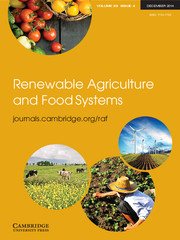Article contents
Organic farmer perceptions of reduced tillage: A Michigan farmer survey
Published online by Cambridge University Press: 11 July 2017
Abstract
A common critique of organic farming is that it is very tillage intensive, and therefore deleterious to soil quality. However, little information is available on the tillage practices currently employed by organic farmers, as well as organic farmers’ attitudes toward reduced tillage (RT). To address these knowledge gaps, a detailed written survey of Michigan organic field crop and vegetable farmers was conducted to investigate their current tillage practices, as well as their perceptions of the barriers and benefits to adoption of RT. Respondents reported a wide range in tillage frequency and intensity, both across and within production of specific crops, with operations split evenly between field preparation and cultivation. Compared with field crop growers, vegetable growers were generally smaller scale and relied more heavily on a limited set of tillage (e.g., rototiller) and cultivation tools. Interest in adoption of RT practices among respondents was low to moderate with median Likert scale ratings (0–7 scale with 0 representing no interest and 7 extreme interest) of 4 or less for all forms of RT. Vegetable growers were most interested in permanent beds, rotational tillage and strip tillage, whereas field crop growers were most interested in rotational tillage and strip tillage. The greatest perceived benefits to adoption of RT were improved soil quality and fuel savings. Both groups ranked weeds, impacts on yields, residue management and crop establishment as high barriers to RT adoption. Vegetable growers also cited lack of scale appropriate equipment as a major barrier. Survey results suggest that future research efforts should focus on overcoming key barriers to adoption, such as weed management and access to low-cost adaptable RT equipment rather than reiterating relatively well-known soil quality benefits. Our results also suggest that promotion of incremental reductions in the frequency and intensity of tillage operations on organic farms may be more realistic and equally valuable compared with promotion of more extreme forms of RT such as no-till.
- Type
- Research Paper
- Information
- Copyright
- Copyright © Cambridge University Press 2017
References
- 16
- Cited by


